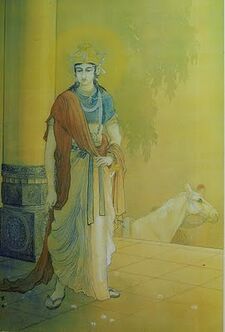User:Premislyd/Satria
Prasama (賞賛; from Parbhan: praśaṃsā, "adoration") refers to a numerous cultural movements in Satria, particularly Patasura, that promoted and idealized the themes and aesthetics of south Coius, initially Shangea but later switching to Senria. The term has since evolved to come to refer to and encompass both the exoticization and fetishization of south Coian peoples, including but not limited to Baeans, Senrians, and Shangeans, but also particularly the idealization of Senrian culture. Since the collapse of the Satrian Republic, the term "political prasama" has been used by contemporary Satrian political scientists to describe the Patasuran political system, which is heavily modelled and influenced by both the Senrian Aikokutou and Shengean National Principlism.
The movement was initially purported by the lesser nobility in the Bay of Bashurat, but spread to both the mercantile and higher nobility over the course of the 16th and 17th centuries as a result of the hiring of tankenhei as warriors and court scribes throughout Satria. Prasama was initially a means of lessening the cultural divide between Satria and Senria with the ultimate goal of attracting tankenhei. This was taken to the extreme in practice, however, and nearly saw the complete embrace of Senrian and Shangean culture throughout the Bay of Bashurat, particularly during the interregnum years of the 16th century.
Prasama was based on extensive interest in south Coian civilization, as well as attempts to replicate and reproduce them. "Prasamists" commonly adopted south Coian style names and attire, used south Coian themes and motifs in art and literature, and widespread adoption of south Coian philosophy or the blending of such philosophy with extant systems already present in Satria. Patronage of the movement varied from state-to-state but found a particularly strong foothold in Patasura. At the movement's height, its state patronage saw widespread restructuring of states based on the south Coian model, including the adoption of the imperial examination, patraonization of Zohist monks through a perversion of the sengshui system, and various hybridizations of Neo-Taoshi with local governance. "Prasamic reformism" continued to in some form or another until Satria's colonization by Euclean powers.
Critics of the movement have referred to it as "Satrian Meridionalism," and even contemporary Satrian philosophers and writers bemoaned the movement as a gross simplification of south Coius, and a fascination with a stereotyped and one-dimensional view of south Coian culture as a whole.
In the modern era, prasama has largely fell to irrelevance as the widespread colonization of Satria by Estmere and Etruria entrenched Euclean social and philosophical ideas in Satrian society. However, the term does see usage as a derogative, to refer to admiration and fascination with south Coian culture. The term "political prasama" is used to refer almost exclusively to the Patasuran government structure, and has come to be synonymous with the Euclean political term "Southern democracy" within Satria.
The rise and decline of the prasama movement has remained a subject of debate. Prevailing theory holds that the movement was largely the result of Satrian view of the apparent stability of south Coian states that sharply contrasted with the rapid rise and decline of Satrian polities. The decline of prasama has largely been attributed to Euclean colonialism, the end of the tankenhei, and revivalist movements within Satria itself.
